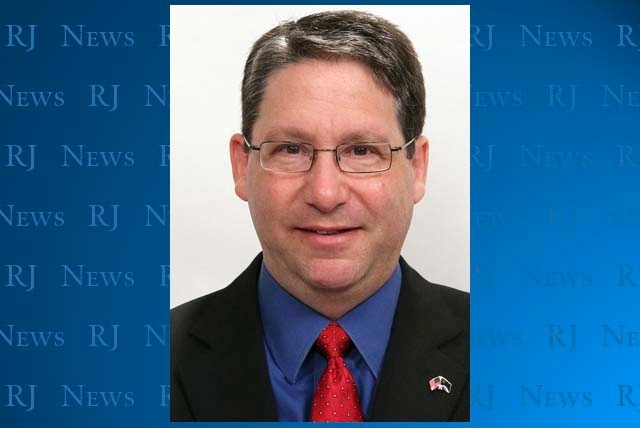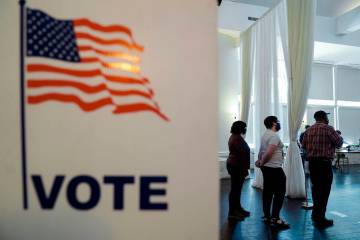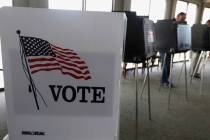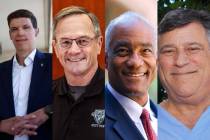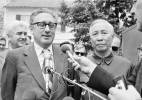Life moves on for Nevada legislator who survived residency controversy
CARSON CITY — Members of the Nevada Assembly faced a difficult and historic decision earlier this year when they took an unprecedented vote to expel colleague Steven Brooks because of his ongoing erratic behavior.
But Assembly leaders took a pass on a controversy involving another member, Assembly freshman Andrew Martin, D-Las Vegas, over questions about whether he actually lived in his district.
Martin said last week that the controversy is old news and that his constituents don’t even ask about it. He said he will run for re-election next year, and Assembly Speaker Marilyn Kirkpatrick said the lawmaker has the support of the caucus.
“I don’t foresee his residency being an issue,” she said.
Martin said the issue is settled as far as he is concerned.
“Ultimately there were no challenges to my election,” he said. “Ultimately I know in my heart I did follow the law to the letter. It’s more of a cocktail party joke at this point. I’m done with it.”
But if this rare residency question ever erupts again, it might not go unchallenged by state lawmakers as it did in Martin’s case, according to a Republican leader in the Assembly.
HOW IT HAPPENED
The issue was alive and well on the eve of Election Day last November .
Nevada law requires state lawmakers to live in the district they represent, and questions were raised about whether Martin lived in his Assembly District 9.
His Republican opponent, Kelly Hurst, challenged Martin’s residency in court. Hurst won a ruling that found Martin did not live at 7159 S. Durango Drive, Unit 307, in District 9, as he claimed, but instead resided at 3317 Daylight Moss St. in Assembly District 2, a short distance over the line separating the two districts.
Hurst hired a private investigator who presented information showing that Martin plugged in his electric car nightly at the house outside the district.
Martin said the Moss Street address is used as an office and he charged the car while working there. It is his former residence.
“It is my view that Andrew Martin may not be a candidate for the office of Assembly District 9,” Clark County District Judge Rob Bare said following about three hours of testimony. “My finding is that his candidacy is not valid, he is not eligible to run based upon his failure to meet the residency requirement.”
The Clark County District Court ruling came after early voting already had been completed. Martin went on to win in the heavily Democratic district.
Martin said he initially planned to appeal Bare’s ruling.
“It would have been nice to clear my name, but money was a factor and it also would have run into the session and have been a distraction,” he said.
Because there was no appeal, the matter has no value as a legal precedent on the issue of residency of state lawmakers.
Hurst did not file a formal challenge with the secretary of state’s office, because it could have cost as much as $50,000.
And since the state constitution says the Legislature determines the qualifications of its own members, and Democrats controlled the Assembly by a 27-15 margin, there was no move to take up Martin’s residency issue when the Legislature convened in February.
Democrats have controlled both houses of the Legislature for the past two sessions, and are favored to maintain control of the Assembly, at least, in 2014.
The Assembly’s Democratic leaders did not independently review Martin’s residency issues.
CHALLENGER: CASE SETS PRECEDENT
Hurst said the Assembly’s failure to address the issue has set a de facto precedent.
“If we really want people to live where they say they live, we need to make an example out of those caught cheating,” he said. “All we’ve done is show that you don’t need to live in the district. If you belong to the right party, you will still be seated.”
A bipartisan bill meant to address some of the issues raised in the Martin residency matter failed to win final approval in the session that ended in early June. Martin voted for the bill along with his Assembly colleagues, but it did not get out of the state Senate.
The bill would have changed the definition of a candidate’s residence to “the place where the person actually, physically and corporeally” lives. The defeat means the current definition of a candidate’s residence as the place where the person is “legally domiciled and maintains permanent habitation” remains the law.
Assembly Minority Leader Pat Hickey, R-Reno, who co-sponsored the failed bill with Kirkpatrick to clear up some of the residency issues, said there were several reasons why there was no effort to challenge Martin’s legal standing to serve.
“The jury pool of 27 Democrats versus 15 Republicans didn’t favor Kelly Hurst,” Hickey said. “And given the problems that were presented by Mr. Brooks, the Legislature could have become more of a three-ring circus, or at least a two-ring circus, had the issue been taken up.”
Hickey said cost was also a factor in the decision not to challenge Martin’s eligibility to serve, an issue the failed bill would have addressed.
Given that the legislative effort to resolve the issue failed, Hickey said he will have to consider challenging the seating of a candidate facing such allegations in future sessions.
“The bill would have been a clear message that it has been a problem and we as a legislative body wanted to address it ourselves,” Hickey said. “Given the fact that the Senate decided not to pass it, I think it is a disappointing message that we’re not apparently interested in governing ourselves with respect to that.
“Given the fact that the bill was Deep Sixed, I might be more inclined to make an issue of it at the Legislature itself,” Hickey said.
It is unfortunate, however, because starting a session with such a divisive issue would not help in moving forward cooperatively with the Legislature’s work, he said.
MARTIN CRITICIZES COURT HEARING
Martin said he does not believe the court hearing on his residency was conducted fairly. Evidence he presented to show there was no issue was ignored by the judge, he said.
Residency challenges are rare in Nevada politics.
The issue came up in 2006 when then-Clark County Commissioner Lynette Boggs McDonald was running for re-election. A private investigator videotaped her in a home outside her district. She lost re-election before the issue could come before a court.
A certified public accountant, Martin went on to serve in the recent session.
He introduced four bills, including one requiring the state budget director to establish a phone number to receive information relating to fraud, abuse and waste of public money. It takes effect Monday .
Three others did not pass.
Martin said his bills touched on significant issues, such as the long-hauling problems with some Las Vegas taxicab drivers, and seeking alternatives to incarceration for first-time felons.
While they did not ultimately win approval, Martin said he will pursue the issues again in 2015.
He was also a major sponsor of a bill to legalize the use of marijuana, which failed, and a measure that could go to voters in 2016 that would legalize gay marriage in Nevada. Martin is one of several openly gay members of the Legislature.
Hurst said he has not decided if he will seek to challenge Martin next year. The district, located in far southwestern Las Vegas Valley south of Flamingo Road and west of Durango Drive, has a more than 3,000 Democratic voter registration edge now.
Hurst said that when he told voters about the residency issue ahead of the 2012 election, he was told frequently by Democrats that they were voting for the party candidate regardless of the issue.
Contact Capital Bureau reporter Sean Whaley at swhaley@reviewjournal.com or 775-687-3900.



